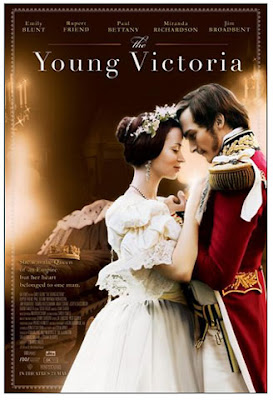The Young Victoria (***)
 Directed by: Jean-Marc Vallée
Directed by: Jean-Marc ValléeStarring: Emily Blunt, Rupert Friend, Paul Bettany, Miranda Richardson, Jim Broadbent, Thomas Kretschmann, Mark Strong
Seen: July 1st 2009
*** Out of ****
The Young Victoria tells of the Queen Victoria’s younger years in office, and the romance between her and Prince Albert during these years, and it does so in a fashion that not most period dramas do. The previous serious period drama I saw was The Duchess with Kiera Knightley, and I found that to be excruciatingly boring and uninvolving. In this regard, The Young Victoria is everything The Duchess was not. Both deal with British royalty, with The Duchess’ story preceding that of The Young Victoria by approximately 65 years. The men are still controlling, but to a lesser degree since Victoria is the incumbent Queen, unlike Georgiana, a “less important” duchess. Both are mistreated by men, but in The Young Victoria this is restricted to a few shoves and hard words. Were these people controlling (or trying to control) her for their own gain, or for her good?
Victoria (Blunt) started out with Sir John Conroy (Strong) as her regent, but when she became old enough to rule, she would not sign the necessary documentation to have him continue in this role. Because of this and Conroy’s strong drive to get power together with Victoria’s mother, the Duchess of Kent (Richardson), Victoria effectively got rid of them in setting up what she believed to be a good empire. To replace Conroy, Victoria appointed the Lord Melbourne (Bettany) as her advisor, and later prime minister. After murmurings by King William (Broadbent), Lord Melbourne was rumoured to be Victoria’s love interest, so much so that at a theatre event an anonymous person called her Ms Melbourne.
While trying to figure out how to rule her kingdom, Victoria lost sight of almost anything else, apart from her friendship, and eventual romance, with Prince Albert (Friend), son of King Leopold of Belguim (Kretschmann). She did not even see his possible value for her reign, and tried to do and decide upon everything herself. But slowly a love started growing between the two, which is a strange thing in this type of film, as it usually concentrates on the horror of arranged marriages. Here Albert is trained in the things Victoria enjoys, he is expected to report back home with news on anything regarding Victoria, as his father tries to play an elaborate game of chess with him and Victoria, which is foiled by both Albert and Victoria’s honesty towards each other regarding the games being played with their lives by others.
Through all of Victoria’s trails and hardships in learning how to govern her kingdom, Albert was always there, the only one content with only being with her and not trying to grab power in some way or another. Their at first awkward relationship is beautifully realised on-screen, with the moment they actually fall for each other as bright as day, with even a nod from a competitor afterward in lieu of losing in this encounter.
Some characters are painted as obnoxious royals, some as humble leaders, and some as gentle advisors, and Victoria has to navigate this minefield of who-to-trust throughout, all the while trying to get the timing of events just right. The film does not romanticise the royal family, rather choosing to focus on the romance between Victoria and Albert with the politics forming an effective back-drop to the story, and it is a rather grand story, even if you’re not that big a fan of period dramas.


Comments